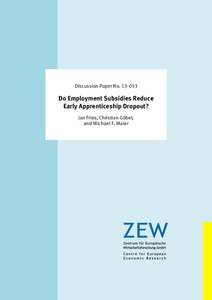Do employment subsidies reduce early apprenticeship dropout?
"In many countries, apprenticeship training plays a major role for school leavers to enter the labour market. Despite the importance of the apprenticeship degree, dropout of apprenticeship training is frequent: in Germany more than 20 per cent of apprentices drop out before the end of training....
| Main Authors: | , , |
|---|---|
| Institution: | ETUI-European Trade Union Institute |
| Format: | TEXT |
| Language: | English |
| Published: |
Mannheim
2013
ZEW |
| Subjects: | |
| Online Access: | https://www.labourline.org/KENTIKA-19124672124919428549-Do-employment-subsidies-reduce.htm |
| Summary: | "In many countries, apprenticeship training plays a major role for school leavers to enter the labour market. Despite the importance of the apprenticeship degree, dropout of apprenticeship training is frequent: in Germany more than 20 per cent of apprentices drop out before the end of training. Early dropout is prevalent, as about half of all dropouts occur during the first year of apprenticeship training, and one third occur during the first four months (i.e. during the probationary period).
In 2008, the German Federal Government introduced the Apprenticeship Bonus to support disadvantaged young people. The Apprenticeship Bonus should help them to find an apprenticeship position and to obtain the degree. Only young people who have unsuccessfully searched for apprenticeship positions after leaving school for at least one year are eligible for Apprenticeship Bonus. The programme provides a 4,000 to 6,000 € subsidy to firms who offer a position to an eligible apprenticeship seeker. The two-part payment is conditional on completing the probationary period and on completing the final exam.
The subsidy provided by the Apprenticeship Bonus decreases labour costs of entitled apprentices by a substantial share. It can be shared with apprentices by higher wages, or firms could pass non-monetary transfers to subsidised apprentices. Non-monetary transfers can comprise, for example, more guidance, higher commitment, more patience and concessions, more encouragement and support towards the apprentice, or better working conditions. If the rent is shared between the firm and the apprentice we expect the subsidy to reduce dropout from apprenticeship training.
We investigate whether the Apprenticeship Bonus is an effective measure to reduce dropout of apprenticeship training for disadvantaged apprentices. In order to identify the effect of the programme, we compare early dropout rates of apprentices subsidised by Apprenticeship Bonus with eligible but unsubsidised apprentices. We use detailed survey data containing extensive information on both groups of apprentices. The amount and quality of our data justify an evaluation approach that is based on selection on observables in order to control for selective programme participation.
Using propensity score matching, we find no significant effects of Apprenticeship Bonus on monthly dropout rates during the first 12 months of apprenticeship training. Our findings state that subsidised vocational training is ineffective in decreasing dropout. However, the time pattern of the insignificant effects fits the incentive structure provided by the Apprenticeship Bonus. Estimates are negative in the first four months, when the first payment is transferred after completing the probationary period. Estimates turn positive afterwards. This suggests that during the probationary period there is a notion of a favourable impact of Apprenticeship Bonus on dropout risk." |
|---|---|
| Physical Description: | 33 p. Digital |

